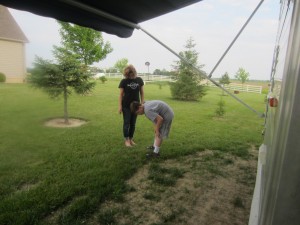Drew Meyer (Fort Loramie, OH)
by Kristie Meyer
Our STX209 Story
For years we have been asked to write a vision statement for Drew’s IEPs. We always write something to this effect: “We would like Drew to meet his full potential and become a valued member of society, forming meaningful friendships and eventually gainful employment.”
In all honesty, this seemed unrealistic when he was younger. But, as optimistic parents who have big hopes for their child, we went with it. He has always liked people, but his anxiety has prevented him from forming real friendships.
Drew attended Kindergarten in our district. I spoke with his class about Drew and his special needs. A few kids knew him from early intervention, but they were all receptive to getting to know him. Kindergarten was not a very successful year for him, and we decided to send him to a private school for kids with special needs. That was fine, and he atteneded there for three years. We felt one important thing the school was lacking was peer models. Kids with Fragile X are big imitators, and he didn’t have a lot of positive peer models to learn from. This was the main reason we brought him back to our home district. He rejoined his classmates in fourth grade.
His classroom was on the second floor of the school. One would not think this would be a problem, but Drew had a massive fear of stairs. Gravitational insecurity will make you feel like you are going to fall off the face of the earth when your feet get off the ground. So will going up and down two flights of stairs. We went the summer before school started and practiced the stairs. His classmates would encourage him, but often he would melt down at the bottom of the stairs, throwing his backpack on the floor.
I once again went into his classroom and spoke with his classmates about Drew. This time, I explained Fragile X in detail. My goal was to help them get a real understanding of who Drew is and why he acted like he did.
Lunchtime was another thing that was difficult for him. It is noisy and smelly in the cafeteria. It is a large space with lots of kids moving around and yelling. He sat by himself every day for the whole year. Kids would come by and give him high five or say hi to him. His response would be mumbled and his head would be down.
Drew sees Dr. Berry-Kravis at Rush University Fragile X clinic. She told us about the STX-209 drug trial. She said she thought Drew would be a good candidate for it. We decided to give it a try. There were many ups and downs during the double blind portion of the study. There were times when we could see a real difference in Drew’s anxiety. He started talking more–and on relevant topics.
When it came time for the extension, we saw immediate changes. The first day we sent him to school on the medicine, his aide (who wasn’t aware we had started the extension) wrote in his communication book that he had had his best day ever!
As he continued on the STX209, we started seeing amazing changes in him. He spoke to people in the hallways at school, getting through doorways got a whole lot easier for him. In sixth grade, he sat with his classmates every day at lunchtime. He was able to attend social studies with his classmates, all specials and participated in science projects. In October, he went with a group of his friends going trick or treating. He had a blast!
I am a cook at the school and people came up to me all the time because they wanted to tell me how amazed they were by the transformation Drew made. The term “miracle drug” came up often.
He was like a different child. He enjoyed going to school and being with people. His communication increased and his anxiety descreased. We could run errands. Waiting in lines and getting past automatic doors became doable. The IEP vision statement we came up with started to look like a real possibility. He already had the friend part down. And he is a valued member of his class.
Then we received the devastating news that the STX209 trial was discontinued. Blessedly, we were able to get through the school year before having to start weaning him. But once we did, we started seeing those old behaviors and challenges returning. He spends a lot more time away from people. In his room with the door closed, he hand-flaps and squawks at his bed. His spontaneous converstion has decreased greatly, and we are seeing him going around with his head down. When someone engages him in conversation, he often bends over in half, unable to make eye contact.
He started hurting himself. Biting his hand and fingers. Even punching himself in the face. He started pulling my hair and hitting me, things he had never done too much of before. It is so sad to see him having trouble with things that had gotten so easy for him. He doesn’t understand why things are more difficult. And it is not fair to him.



Leave a Reply